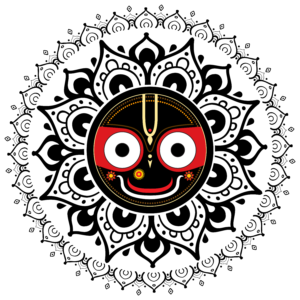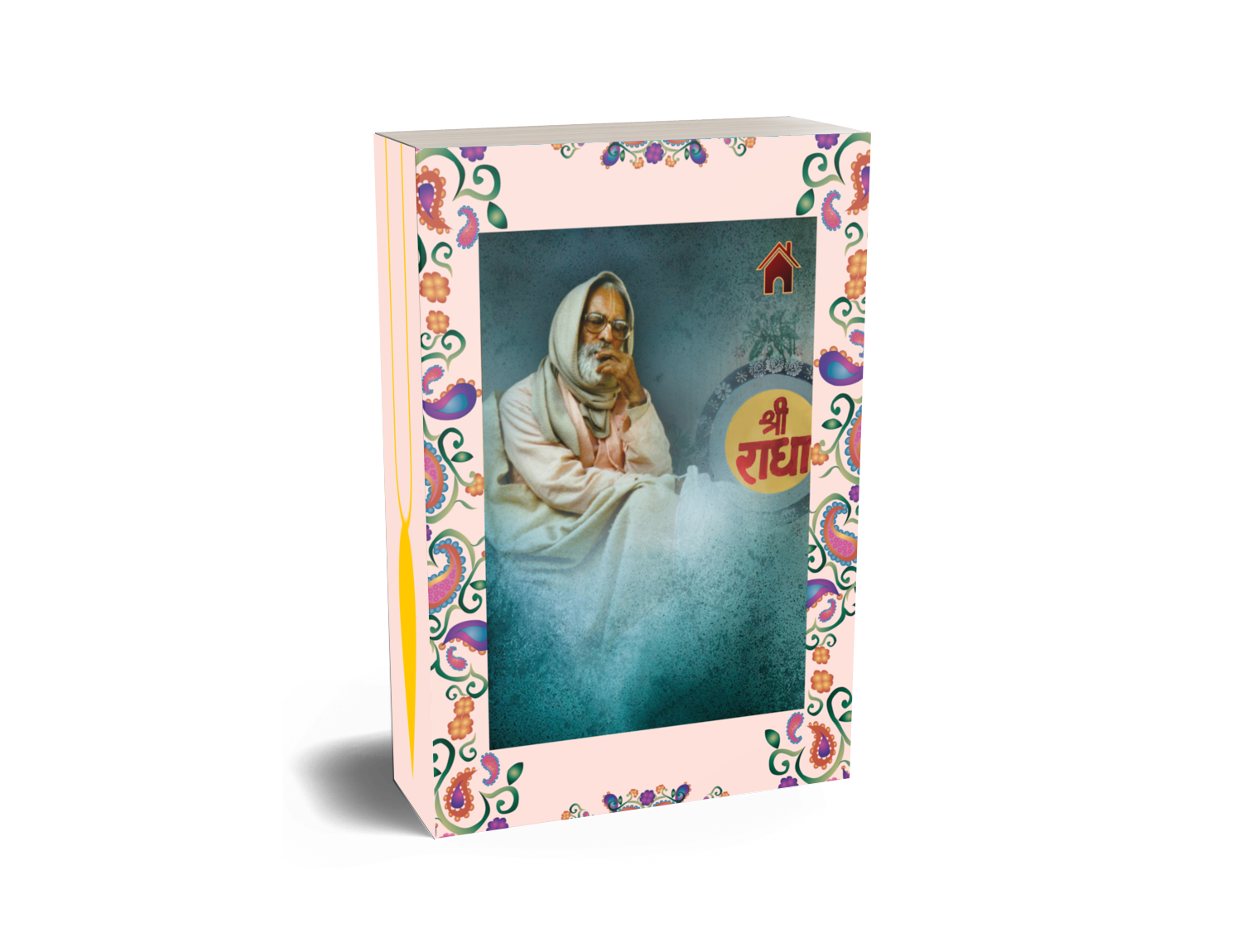

The following is a transcription of a darśana with Śrīla Bhaktivedānta Nārāyaṇa Mahārāja in a Meditation Centre, in Germany, on December 4, 2000
Prema-prayojana dāsa: …in the process of bhakti, it seems that this is not spontaneous, so much hard  endeavour and natural love is not coming. So why, if love for Kṛṣṇa is spontaneous, is it not coming naturally, as one is naturally going towards māyā.
endeavour and natural love is not coming. So why, if love for Kṛṣṇa is spontaneous, is it not coming naturally, as one is naturally going towards māyā.
Śrīla Bhaktivedānta Nārāyaṇa Mahārāja: By an example you can understand this. Naturally lohe ko cumbaka ākarṣaṇa.
Prema-prayojana dāsa: A magnet attracts iron.
Śrīla Bhaktivedānta Nārāyaṇa Mahārāja: Naturally, but if rust is there on the iron, or it is covered with mud or anything, then the magnet cannot attract iron. It is natural, by constitutional position, that a magnet will certainly attract iron, but the iron should be pure. If it is not pure, this natural attraction will not come. So rust has come on our constitutional position. The attraction is natural if you are pure. If the soul is pure, then it is natural that spontaneous love certainly will come. It is in its natural position, its natural constitution. But now some worldly desires have come, and that is why it is covered with two things. One is this material body, the gross body, and the other is the subtle body. If they will go away, oh, natural, spontaneous love is there. That is why a process should be adopted like that adopted by our ācāryas, who have spontaneous love for Kṛṣṇa, like Rūpa Gosvāmī, like Raghunātha dāsa Gosvāmī, like Kṛṣṇa Himself in the shape of Caitanya Mahāprabhu, always [filled with] spontaneous love. Have you heard that when He was in Purī, in Gambhīrā, always [crying], “Hā Kṛṣṇa, Ha Kṛṣṇā. Where is He?” And sometimes, “Oh, Kṛṣṇa is here,” and He’s embracing Him. He is weeping. And if He is serving Kṛṣṇa in the shape of Rādhikā, or [a] gopī, you can see spontaneous love, always weeping, always weeping. Rūpa Gosvāmī was the same. You can see Raghunātha dāsa Gosvāmī. How pathetic his life was there, oh, spontaneous love. Sometimes meeting, sometimes separation, both, and this is the symptom of that love. So you will realize this.
Prema-prayojana dāsa: This is inside.
Śrīla Bhaktivedānta Nārāyaṇa Mahārāja: Inside the soul is pure, this potency is there, but this potency is now covered. You will have to remove the covering.
Guest: May I ask another question?
Śrīla Bhaktivedānta Nārāyaṇa Mahārāja: First you should express [if you have] any doubt. Are you satisfied?
Guest: Yes. I would like to ask.
Śrīla Bhaktivedānta Nārāyaṇa Mahārāja: You can argue anything, you can argue, no harm.
(Devotees start to laugh)
Śrīla Bhaktivedānta Nārāyaṇa Mahārāja: Don’t laugh.
Guest: This question may be an argument, or maybe a…
Śrīla Bhaktivedānta Nārāyaṇa Mahārāja: There are two kinds of arguments. In [the] Gītā it has been explained that if you 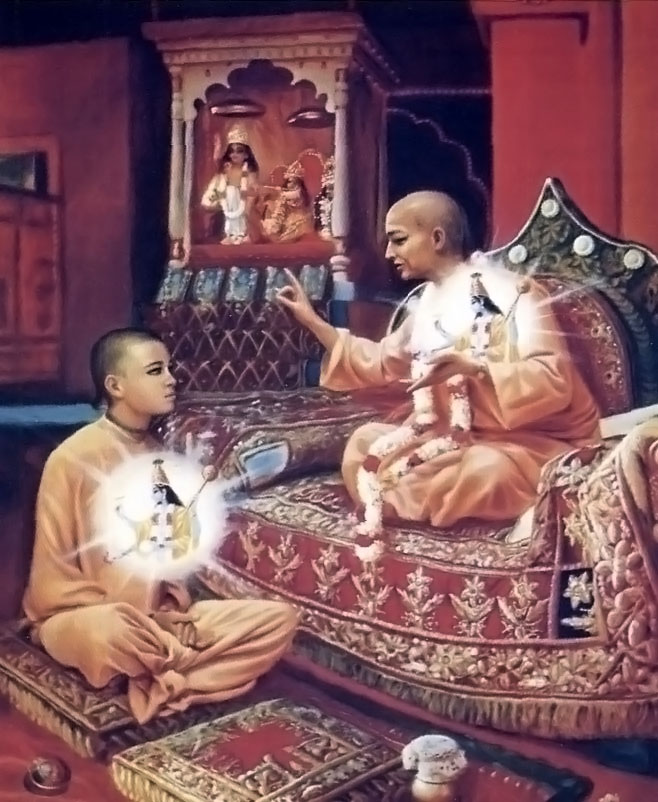 want to know the real thing, then ‘tad viddhi praṇipātena paripraśnena sevayā,’ not with jñāna (experimental knowledge), but in a very humble way you should ask, “I want to know this and you are qualified. You can remove my doubts. So if I am qualified to hear, please instruct me.” This is the humble way, and by this you can achieve realization. Otherwise if you are coming to fight without surrendering, I will not reply, because my time will be wasted. This is the thing.
want to know the real thing, then ‘tad viddhi praṇipātena paripraśnena sevayā,’ not with jñāna (experimental knowledge), but in a very humble way you should ask, “I want to know this and you are qualified. You can remove my doubts. So if I am qualified to hear, please instruct me.” This is the humble way, and by this you can achieve realization. Otherwise if you are coming to fight without surrendering, I will not reply, because my time will be wasted. This is the thing.
Guest: I want to understand it more deeply and therefore I would like to ask about…
Śrīla Bhaktivedānta Nārāyaṇa Mahārāja: One more thing. You cannot realize until you are in that process. One thing also. If Kṛṣṇa will come Himself, and He will want to satisfy you, He cannot.
Guest: He cannot?
Śrīla Bhaktivedānta Nārāyaṇa Mahārāja: He cannot, if the dust is there. Unless you are humble like Arjuna, and He will not explain all these things to Duryodhana. Duryodhana may ask, and His answer is there in Mahābhārata. “I know you, but I cannot explain you these things. Because you are acting in such a way, you have made it impossible for me to explain.” There is a śloka there. That is why we should be humble to hear all these things, and then really you will realize, very soon. Go on.
Guest: By this covering of dust, I think it is meant this material body.
Śrīla Bhaktivedānta Nārāyaṇa Mahārāja: The material body has been made by the desires you have. This is how the gross and subtle bodies have manifested. It is due to our thoughts, desires, unwanted things. We wanted to taste this world. And that is why Kṛṣṇa’s māyā gave it, in the shape of the gross and subtle body.
Guest: And how can I understand the spiritual body? Because I think it is very important that there is a spiritual body.
Śrīla Bhaktivedānta Nārāyaṇa Mahārāja: By serving sādhus, by sat-saṅga, by the association, gradually your knowledge will be developed, and your unwanted things, desires will go away, and then you are realized. Certainly you will realize it. But you will have to come to that process.
Guest: Can you describe a little bit about the spiritual body, or your experiences with this body, for our readers?
Śrīla Bhaktivedānta Nārāyaṇa Mahārāja: I can describe, but there is a question. There is a mango, it is sweet.  Honey is also sweet. Can you explain how the mango is sweet and how the honey is sweet, what is the difference, can you explain? (devotees laugh) Very difficult, very difficult. There are some things I can explain, Rūpa Gosvāmī can explain, Vedas have explained, Mahābhārata has explained, Śrīmad-Bhāgavatam has explained, Caitanya-caritāmṛta has explained. But to express it and to make it realized to others is very difficult until they reach that stage, then easily they can realize it. If I will give, “Oh, you want to see what is the difference, oh, this is honey and this is mango. You should taste and you should see, compare”, then by experience you will know, but by words you cannot explain.
Honey is also sweet. Can you explain how the mango is sweet and how the honey is sweet, what is the difference, can you explain? (devotees laugh) Very difficult, very difficult. There are some things I can explain, Rūpa Gosvāmī can explain, Vedas have explained, Mahābhārata has explained, Śrīmad-Bhāgavatam has explained, Caitanya-caritāmṛta has explained. But to express it and to make it realized to others is very difficult until they reach that stage, then easily they can realize it. If I will give, “Oh, you want to see what is the difference, oh, this is honey and this is mango. You should taste and you should see, compare”, then by experience you will know, but by words you cannot explain.
There is something about Kṛṣṇa and His love, spontaneous love. Like this. Mahāprabhu has explained this. Nārada explained to Vyāsa, but he could not understand and he said, “Oh, now you should experience.” And then he saw by bhakti-yoga who is Kṛṣṇa, how is Kṛṣṇa, how sweet pastimes are there, and then he realized. In [the] Gītā or anywhere it has been explained. By words.
nāyam ātmā pravacanena labhyo
na medhayā na bahunā śrutena
yam evaiṣa vṛṇute tena labhyas
tasyaiṣa ātmā vivṛṇute tanūṁ svām
(Muṇḍaka Upaniṣad 3.2.3)
“The Supreme Lord is not obtained by expert explanations, by vast intelligence, nor even by much hearing. He is obtained only by one whom He Himself chooses. To such a person He manifests His own form.”
Go on.
Guest: Another question, is there a difference between men and women, or is this difference an illusion? What do you say?
Prema-prayojana dāsa: He’s asking if there is a difference between men and women, or is this difference coming from illusion?
Śrīla Bhaktivedānta Nārāyaṇa Mahārāja: In the transcendental world there are moods of ladies and males. 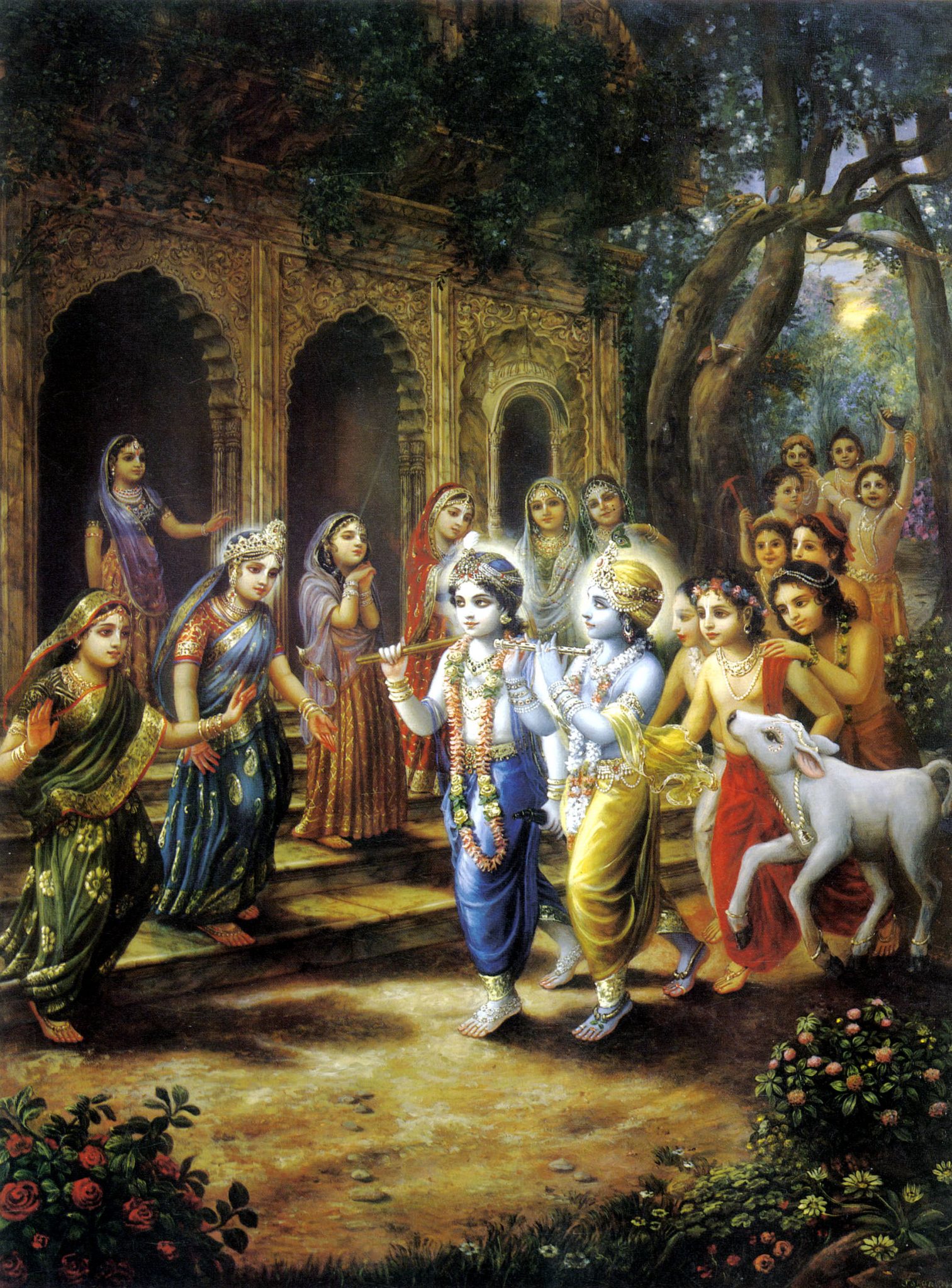 Kṛṣṇa is the only male there and all are like females, and the highest class is female. The body of Kṛṣṇa in a separate manifestation is Śrīmati Rādhikā, and the love between that male Kṛṣṇa and female Rādhikā is very tasteful. This is called mahābhāva, and this is our goal. That is why we see that in this world, wife and husband, lover and beloved, they love each other. And if that love is sincere, for their whole life they can maintain this. But in this world it is absurd. But in that world it is real. So Caitanya Mahāprabhu discovered this unnatojjvala upapati-bhāva (the elevated extramarital amorous mood). Like in this world, if anyone loves his beloved or her beloved, it is very tasteful. But if you can change the object of your love, and think within yourself that “I’m [a] gopī. I’m female like [the] gopīs, and Kṛṣṇa is my beloved,” very soon you can change the object of your love. By the process of our Rūpa Gosvāmī you can change it. If you are not adopting that process, you cannot have this in millions and millions of births. This is the thing. It is very tasteful, as Caitanya Mahāprabhu discovered.
Kṛṣṇa is the only male there and all are like females, and the highest class is female. The body of Kṛṣṇa in a separate manifestation is Śrīmati Rādhikā, and the love between that male Kṛṣṇa and female Rādhikā is very tasteful. This is called mahābhāva, and this is our goal. That is why we see that in this world, wife and husband, lover and beloved, they love each other. And if that love is sincere, for their whole life they can maintain this. But in this world it is absurd. But in that world it is real. So Caitanya Mahāprabhu discovered this unnatojjvala upapati-bhāva (the elevated extramarital amorous mood). Like in this world, if anyone loves his beloved or her beloved, it is very tasteful. But if you can change the object of your love, and think within yourself that “I’m [a] gopī. I’m female like [the] gopīs, and Kṛṣṇa is my beloved,” very soon you can change the object of your love. By the process of our Rūpa Gosvāmī you can change it. If you are not adopting that process, you cannot have this in millions and millions of births. This is the thing. It is very tasteful, as Caitanya Mahāprabhu discovered.
Puṇḍarīka dāsa: One time Gurudeva explained that this is just like in a drama. In a drama, there are so many players who are acting in different roles. There may be a play where only those who are male are performing, but one male may take the dress of a female, and then he’s acting as a female, and the other males in the drama act with that person as if he’s female. Similarly in this world, due to our impressions from our past life and our desires, whatever desire we have at the time of death, we may attain a male body or a female body, but the soul as such, the spirit, is neither male nor female, but it is an energy of Kṛṣṇa, and it has a very special mood which Śrīla Gurudeva described, that is to love Kṛṣṇa.
Prema-prayojana dāsa: In this world male and female forms are here. This is because this world is a reflection of the spiritual world. The original forms are Rādhā and Kṛṣṇa, and They are reflected in this world. So male and female here, it is not a true thing, it is only a reflection of the spiritual world. It is apparent.
Śrīla Bhaktivedānta Nārāyaṇa Mahārāja: For making it easy to love Kṛṣṇa, Kṛṣṇa has created this world as a shadow of the spiritual world, a reflection. In this world, very soon attachment comes for a lady or a male, together. It is natural. But it is a reflection of that world. So we can go there very easily by the process Caitanya Mahāprabhu [has] given us. In this way you should think [within] yourself that Kṛṣṇa is my beloved. In all the mantras it has been explained, everywhere the same thing. In [the] Upaniṣads, Gītā, Bhāgavata, everywhere. So we can follow this, but we should do it with a special bona fide guru who has realized something, or everything. If he has realized fully, then he is uttama-mahā-bhāgavata, and if he is not fully realized then he has some semblance of rati (loving attachment). He can give you something. This is a very deep subject matter.
Prema-prayojana dāsa: So Kṛṣṇa, He made this attraction between male and female in this world? Or to make it easy for us to go to that world?
Śrīla Bhaktivedānta Nārāyaṇa Mahārāja: For example, Caitanya Mahāprabhu adopted this process. Why not [make one’s life successful] by this [process]? And so in [the] Vedas [the] gopāla-mantra or all [the] mantras have been given, and they are very powerful. Kṛṣṇa has invested His whole power in these mantras, and by chanting “Mara Mara Marama Rāma Rāma” Vālmīki achieved that position. Śukadeva Gosvāmī also describes the pastimes of Goloka Vṛndāvana, rasa and all these things. These are not of this world, these are of Goloka Vṛndāvana dhāma. He was explaining to Parīkṣit Mahārāja, and Parīkṣit Mahārāja was totally absorbed in that, and he wanted to be a gopī, to serve Kṛṣṇa. Vyāsadeva also explained this and Nārada. This is a very easy process but you will have to give up something. What [is that] thing? That [is] lust.
Guest: Okay. In the interests of my readers, and in the discussion of cultural philosophies, in India it is also very  popular this Śaivism. Believing in Śiva, or worshipping Śiva and śakti. What differences or similarities do you see between the relation between Śiva and śakti, and Rādhā-Kṛṣṇa, and also between the devotees and their Goddess, Gods?
popular this Śaivism. Believing in Śiva, or worshipping Śiva and śakti. What differences or similarities do you see between the relation between Śiva and śakti, and Rādhā-Kṛṣṇa, and also between the devotees and their Goddess, Gods?
Śrīla Bhaktivedānta Nārāyaṇa Mahārāja: What is he asking?
Prema-prayojana dāsa: He’s asking the question that in India the worship of Śiva and śakti is very popular. So he wants to know what is the difference between the relation of Śiva and śakti, and the relation between Rādhā and Kṛṣṇa. Is there some difference, or are there some similarities? This is the first question. And then the second question is, are there some differences or some similarities between those who worship Śiva and śakti, and those who worship Rādhā-Kṛṣṇa?
Śrīla Bhaktivedānta Nārāyaṇa Mahārāja: Oh, there are three kinds of śāstra in India. Tāmasika, rājasika and sāttvika (in the modes of ignorance, passion and goodness). And more than that is nirguṇa (beyond the modes of material nature). There are so many, Brahmāṇḍa Purāṇa and all others. There are Śiva Purāṇa, Mārkaṇḍeya Purāṇa, they are tāmasika Purāṇas. And Brahmāṇḍa and all others are rājasika. Some are sāttvika, and Śrīmad-Bhāgavatam is nirguṇa Purāṇa.
Prema-prayojana dāsa: Viṣṇu Purāṇa and Padma Purāṇa, are they sāttvika Purāṇas?
Śrīla Bhaktivedānta Nārāyaṇa Mahārāja: Hmm. And Śrīmad-Bhāgavatam is nirguṇa pramāṇa (evidence beyond the modes of nature). In this there is no clash, but it is for the person, devotees, according to their standard, qualities. Because those who are absorbed in tāmasika, tamas, they cannot understand nirguṇa, they cannot understand sāttvika. So they can do some fire sacrifice, they can take meat and some things also, intoxication they can do, but they should give up these things and come to rājasika. And rājasika should come gradually to sāttvika, and sāttvika should come to nirguṇa. For this Vyāsadeva has compiled all these things. So in India, very few, very rare, are of nirguṇa thought, mood. Some see that Śaṅkara (Śiva) is himself God, himself Supreme Personality of Godhead. And his śakti, Durga, Kālī and all, are his śakti. But in sāttvika and nirguṇa Purāṇas, in Śrīmad-Bhāgavatam, Upaniṣads, Śaṅkara has been explained like the śakti of Kṛṣṇa, that Śaṅkara is not the Supreme Personality of Godhead. This idea that Śiva is God is for tāmasika [persons]. That you should cut anything, anyone, and give it to Śaṅkara, and he will give you a boon to be a very high-class rich person, wealthy, and you can conquer the whole world. But really this thing is only for tāmasika persons, not for a high standard. So in Śrīmad-Bhāgavatam it has been explained that Śaṅkara is nothing but the śakti, or power, of Kṛṣṇa. So he has been explained to be like Gopīsvara Mahādeva, Gopīsvara, a gopī in Vṛndāvana, and he can give you the right direction, that Kṛṣṇa is the Supreme Personality of Godhead. He can help you like your guru, śakti. Vaiṣṇavānāṁ yathā śambhuḥ.
Prema-prayojana dāsa: Śiva is a great Vaiṣṇava, it is written in Śrīmad-Bhāgavatam.
Śrīla Bhaktivedānta Nārāyaṇa Mahārāja: Vaiṣṇava means belonging to Viṣṇu, the servant, the eternal servant of Viṣṇu. Viṣṇu is Kṛṣṇa. So it is not explained anywhere in [the] sāttvika and nirguṇa Purāṇas, or in [the] Upaniṣads or Vedas, that Śaṅkara is the Supreme Personality of Godhead. He is himself the power of Kṛṣṇa. So we think like this, and thus very easily we can reconcile all these things. So here Śaṅkara is like a gopī, or his power. His power is of three kinds. In the transcendental world, Śaṅkara always serves like the gopīs and other things, with Rāma as Hanumān. And when he comes into this world then he’s Śaṅkara in Kailāsa, and he is always chanting “Rāma Rāma Kṛṣṇa Kṛṣṇa Kṛṣṇa” and giving salvation. But you know Rāvaṇa, Kaṁsa, Jarāsandha, they were worshipers of Śiva, but they were all destroyed by Kṛṣṇa or Rāma. You know Rāvaṇa? He always used to worship Śaṅkara. Rāvaṇa in India.
Prema-prayojana dāsa: Rāvaṇā.
Śrīla Bhaktivedānta Nārāyaṇa Mahārāja: Oh, Rāvaṇa you know. We don’t pronounce the last ‘a’. But Rāvaṇa was always worshipping Śaṅkara. But Śaṅkara said, “I cannot help. Why [did] you kidnap Sītā, and why [did] you want to enjoy her? She’s my worshipable [mother]. So I will not help you. I will help Rāma too.
Śrīpāda Mādhava Mahārāja: Kill you.
Devotee: Defeat you.
Śrīla Bhaktivedānta Nārāyaṇa Mahārāja: And thus Hanumān burnt Laṅkā, and wanted to please Sītā. “Come on my back and I will take you to Rāma.”
Prema-prayojana dāsa: Hanumān is one form of Śiva. So though Rāvaṇa was worshipping Śiva, Śiva himself, 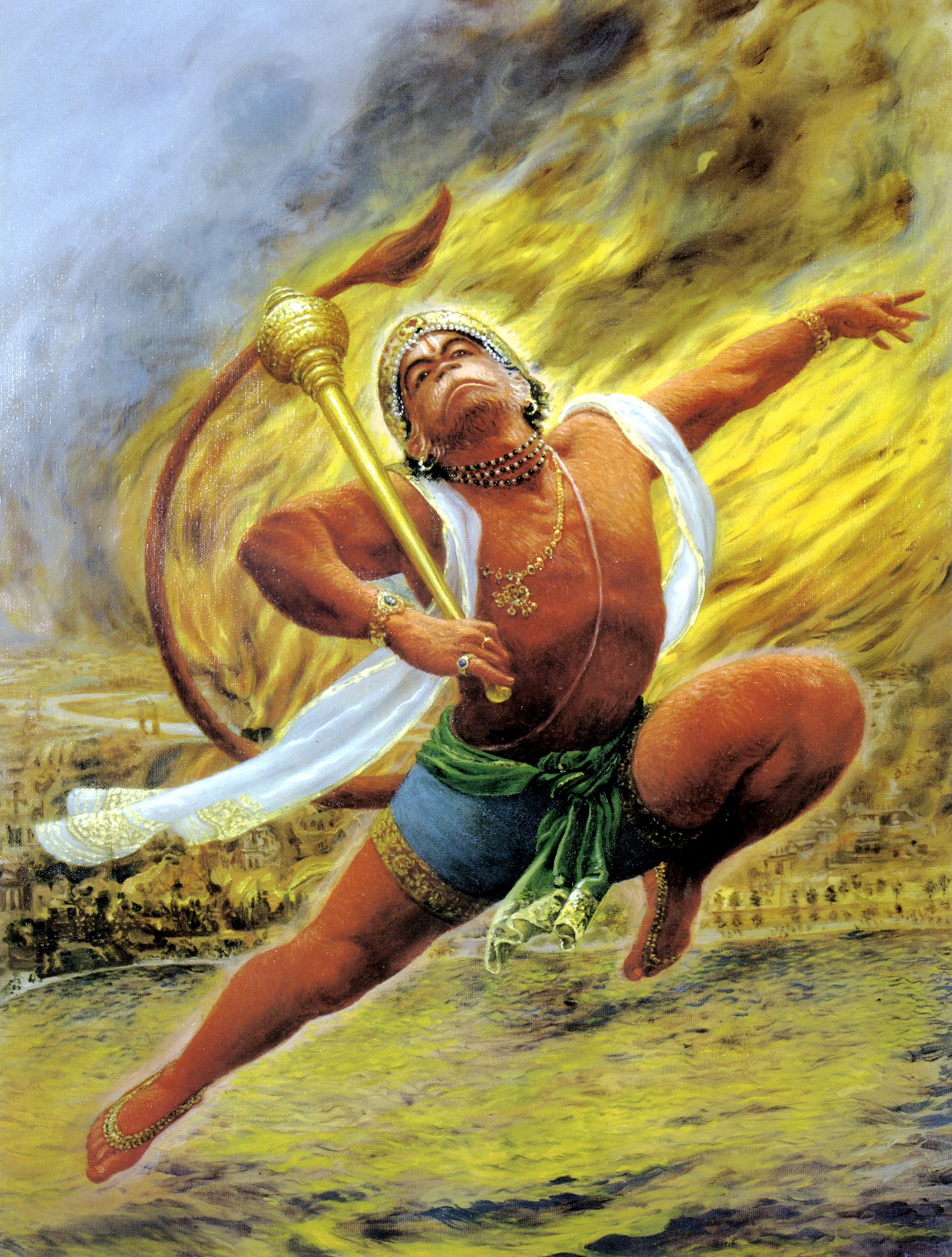 like Hanumān, came there and burnt everything.
like Hanumān, came there and burnt everything.
Śrīla Bhaktivedānta Nārāyaṇa Mahārāja: Śiva himself became Hanumān and he destroyed Laṅkā and destroyed Rāvaṇa. So this strong example is quite fit here. So we should try to know who is Śaṅkara, and how he is worshipped as a śakti, power of Kṛṣṇa or Rāma. Then there will be no doubt, confusion.
Prema-prayojana dāsa: Gurudeva explains that if you worship Lord Śiva, as a devotee of Kṛṣṇa, then he will help in attaining Kṛṣṇa. And if you worship Lord Śiva as the Supreme Personality of Godhead, he himself can destroy you.
Śrīla Bhaktivedānta Nārāyaṇa Mahārāja: Śaṅkara himself. Though Rāvaṇa was a worshiper of Śaṅkara, Śaṅkara himself became Hanumān and destroyed Laṅkā and everything. He killed his all sons because he was against Rāma. Kaṁsa was also like this. He used to worship Rāmeśvara Mahādeva, Śiva. You know? And he wanted to kill Kṛṣṇa, so he made a plan to kill Kṛṣṇa and Baladeva from Vraja, and that plan was to kill Kṛṣṇa with the help of Cāṇūra, Muṣṭika and all other powerful wrestlers. But Kṛṣṇa jumped, He killed the demons and He also dragged Kaṁsa, and He jumped up on him and he was killed. “Oh, why you are now dead? I was only jumping. And you are now dead. What should I do?” Understand? If he is not understanding, you should explain.
Prema-prayojana dāsa: Gurudeva is describing how Kaṁsa was worshipping Lord Śiva. Who? Rāmeśvara  Mahādeva, one form of Lord Śiva in Mathurā in the wrestling arena. So Kaṁsa invited Kṛṣṇa and brought Him from Vṛndāvana to Mathurā for a wrestling match. And there Kaṁsa had so many powerful wrestlers, Cāṇūra and Muṣṭika, and others, and a very powerful elephant, Kuvalayāpīḍa. The plan was that all of them together would gang up and kill Kṛṣṇa. But what happened? Kṛṣṇa threw Kaṁsa and then He jumped. And when He landed there, Kaṁsa was already dead. He said, “Oh, I wanted to play with you. You are like My uncle. I wanted to jump in your lap, but you have died, what can I do?”
Mahādeva, one form of Lord Śiva in Mathurā in the wrestling arena. So Kaṁsa invited Kṛṣṇa and brought Him from Vṛndāvana to Mathurā for a wrestling match. And there Kaṁsa had so many powerful wrestlers, Cāṇūra and Muṣṭika, and others, and a very powerful elephant, Kuvalayāpīḍa. The plan was that all of them together would gang up and kill Kṛṣṇa. But what happened? Kṛṣṇa threw Kaṁsa and then He jumped. And when He landed there, Kaṁsa was already dead. He said, “Oh, I wanted to play with you. You are like My uncle. I wanted to jump in your lap, but you have died, what can I do?”
Guest: Oh, he died before.
Śrīla Bhaktivedānta Nārāyaṇa Mahārāja: And Rāmeśvara Mahādeva could not help. This is the point.
Prema-prayojana dāsa: And the deity, Kaṁsa was worshipping Rāmeśvara Mahādeva, and Rāmeśvara Mahādeva was there in [the] raṅga, that means in the wrestling arena, watching everything. But when Kṛṣṇa came and killed all the wrestlers, and then He got Kaṁsa, and Kaṁsa also left his body, then what did Lord Śiva do?
Śrīla Bhaktivedānta Nārāyaṇa Mahārāja: He was smiling, “Oh, very good, very good. Thank you.”
Prema-prayojana dāsa: You can ask more questions tomorrow.
Śrīla Bhaktivedānta Nārāyaṇa Mahārāja: If he wants, I am very happy to. I want that, I will try to satisfy you, and thus I want to pull you (devotees laugh), take your heart, and bring you into the process [so] that very soon you will have the same love, natural and spontaneous love. I want to help you.
Source: Purebhakti.com
Image/Art made possible by Pixabay.com, Krishnapath.org and/or Bhaktiart.net
Unless indicated differently, all verse translations and quotes are from the books by Śrīla Prabhupāda (Vedabase.com)
